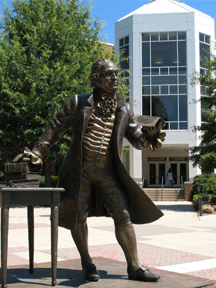By Christine LaPlaca
At Phi Beta Kappa’s 43rd Triennial Council held in August this year, George Mason University in Fairfax, Virginia, was selected to host a new chapter of Phi Beta Kappa. A great honor for any university, George Mason has proven that it exhibits some of Phi Beta Kappa’s most important and advocated characteristics: a high-quality liberal arts education, freedom in education, and dedication to the pursuit of excellence in higher learning.
Marion Deshmukh, a professor of history at George Mason, was a major advocate for a Phi Beta Kappa chapter at the university. Herself a member of Phi Beta Kappa, Deshmukh recognized the importance and history of the Society. In addition, Provost Peter Stearns was involved in acquiring the chapter. Also a member of Phi Beta Kappa, Stearns states he “was supportive of the various phases of application” and his “office provided the staffing for generating data” needed to push the process forward.
Deshmukh attributes their successful application to establish a chapter on campus to the upward trend in “students’ entering GPAs and SAT/ACT scores and the growth of the Honors College, healthy student-faculty ratios, the lovely physical plant, internationally recognized and award-winning faculty,” and the “retention rates of students.” George Mason is now part of the elite list of universities across the country that can claim to be part of Phi Beta Kappa.
According to Provost Stearns, “Mason has a strong and balanced program in general education and a host of undergraduate majors that actively carry out the liberal educational goals of Phi Beta Kappa.” George Mason’s participation in a liberal education, which is vital to Phi Beta Kappa’s message and own goals, helped gain approval for a chapter.
With the addition of a Phi Beta Kappa chapter, George Mason University is now open to multiple opportunities. The university’s president, Angel Cabrera, commented that “the granting of a chapter as a distinct honor for the University, enhancing its prestige as a proponent of liberal arts and sciences education.” The prestige associated with Phi Beta Kappa will allow George Mason to grow in the academic community. Besides bringing the university academic prestige, the addition of a Phi Beta Kappa chapter will strengthen the university’s local community. Deshmukh wrote in an e-mail that the chapter “will be able to co-sponsor various events, such as co-participate in our annual Fall for the Book program, poetry readings, guest lecturers, prizes” and other on-campus activities. President Cabrera also believes “the chapter will enhance our commitment to liberal education, including modern language training, and will call attention to the high quality of our students.”
The university hopes to have its first induction ceremony this spring. This induction ceremony will finally launch the chapter that the university has worked to establish for decades. Provost Stearns will be involved in the initiations and ceremonies, and he hopes “to play at least a small role in defining appropriate activities for the chapter, beyond recognitions, once it is up and running,” he said.
As the chapter grows, President Cabrera hopes that Phi Beta Kappa’s “linkage with [the university’s] large, well established honors program will be another source of support and interest” for the chapter. While the university is happy about the prestige the chapter offers, Provost Stearns states that “above all we welcome the chance to acknowledge our top liberal arts and science students.” The university will be able to recognize its most outstanding students through Phi Beta Kappa, an avenue of honor not previously possible.
Christine LaPlaca is a senior at the University of Mary Washington majoring in English and Asian Studies. The University of Mary Washington is home to the Kappa of Virginia chapter of Phi Beta Kappa.




